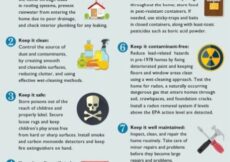June 6th, 2022
June 6-12, 2022 is Child Safety Week! This annual campaign, organized by the Child Accident Prevention Trust, raises awareness of the risks of childhood accidents and how they can be prevented:
The Child Accident Prevention Trust (CAPT) is the UK’s leading charity working to reduce the number of children and young people killed, disabled or seriously injured in accidents.
We exist because accidents are a leading cause of death and serious injury for children and young people.
Many of these accidents can be prevented.
Preventable injuries are the leading causes of mortality in childhood. Firearm-related deaths (homicides, suicides, and unintentional shootings) recently surpassed motor vehicle accidents as the number one threat to children’s lives, followed by suffocation, drowning, drug overdoses, and fatal burns.
Button batteries pose another preventable threat to children’s health and well-being. A growing number of electronic devices (small toys, musical greeting cards and books, night lights, and small remote controls and key fobs are a few examples) are powered by lithium button batteries. Also known as “coin cell batteries” because they resemble nickels, dimes, and quarters in terms of their shininess and shape, lithium button batteries are extremely dangerous to young children if accidentally swallowed. CAPT describes in simple (though graphic) detail what can happen if a swallowed lithium button battery becomes stuck in the upper esophagus:
Most [non-lithium] button batteries pass through the body without a problem. But if a lithium coin cell battery gets stuck in the food pipe, energy from the battery reacts with saliva to create caustic soda. This is the same chemical used to unblock drains!
This can burn through the food pipe, to the main artery and lead to catastrophic internal bleeding and death. The chemical reaction can happen in as little as two hours. However, sometimes it takes days or even weeks.
Lithium coin cell batteries can also cause life-changing injuries. There is a risk that the food pipe is too badly damaged for a child to eat normally again or the vocal cords are too badly damaged for a child to speak normally again.
A study published last month in JAMA Otolaryngology–Head & Neck Surgery confirmed that airway injuries in young children are “a severe and not infrequent consequence” of swallowing button batteries (BB):
Airway injuries are a severe consequence of BB ingestion, occurring more often in younger children. This systematic review found that tracheoesophageal fistulae and vocal cord paralyses were the 2 most common airway injuries, often requiring tracheostomy. Vocal cord injury occurred after a shorter BB exposure time than other airway injuries. Continued efforts should be directed toward prevention strategies to avoid the devastating sequelae of BB-associated airway injury.
A button battery that has been replaced after losing its charge can still retain enough electrical power to cause serious damage. Infants, toddlers, and preschoolers are more likely to accidentally swallow these small, flat batteries for fairly obvious reasons:
Crawling babies up to pre-schoolers are at particular risk as they explore the world by putting things in their mouths. Toddlers are naturally inquisitive and can be very determined to explore and get into things.
Older children can be fascinated by them too. In some cases, they may deliberately put one of these batteries in their mouth or on their tongue to experience the sensation of the electrical charge.
It’s really important to keep these ubiquitous power sources (and other choking hazards) out of reach of curious and grabby children. If parents suspect their child has swallowed a button battery, a visit to the emergency department is advised without delay to locate and remove it to reduce the risk of injury.
Read CAPT’s fact sheet on button batteries here.




































